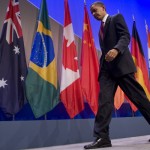Obama's Parade of Foreign Policy Failures
 Can you name one major foreign policy initiative of the Obama administration that is not mired in horrible failure?
Can you name one major foreign policy initiative of the Obama administration that is not mired in horrible failure?
Can you name one major foreign policy initiative of the Obama administration that is not mired in horrible failure?
The Afghan war is going wrong. Diplomatic outreach to Iran was slapped away. Concessions to Russia failed to buy meaningful sanctions. Pro-Obama European governments have declined to send more troops to Afghanistan. Obama's personal relationships with leaders of Germany, U.K. and France are cool to chilly. The President's outreach to the Islamic world has achieved nothing: In fact, more anti-American terrorist plots were launched in 2009 than in any year since 2001. When a pro-Hugo Chavez president tried to hold power illegally in Honduras, the Obama administration backed the lawless president over a unanimous Honduran Supreme Court.
Then, think of all the non-initiatives that might help but are not happening:
Where is the United States as the euro threatens to crack up? Hezbollah is aggressively rearming in Lebanon, the United States does nothing. Washington seems to have no trade policy, no plan for holding Iraq together after U.S. combat troops leave, and has lost all interest in promotion of democracy or human rights.
A few weeks after Barack Obama's 2008 election win, I had a chance to talk to someone who had spent a lot of time with the candidate. I asked: In Obama's own opinion, what is his expertise? What does he think he knows a lot about?
This Obama observer answered: "Foreign affairs."
He saw the shocked look on my face and laughed. "You may think Obama has no reason to think himself an expert, but believe me: he does."
My informant proved exactly right.
At home, Obama has been a largely hands-off president. The major domestic initiatives of his presidency were designed by others with limited presidential input.
The bank rescue was designed and overseen by Treasury Secretary Tim Geithner and Federal Reserve Chairman Ben Bernanke.
The big economic stimulus was written by Democrats in Congress for their own purposes, discarding signature Obama themes such as upgrades to the electrical grid.
Healthcare plan? Again written in Congress, negotiated between House liberals and more conservative Democrats in the Senate. On the key issues in negotiation, including the famous public option, Obama took no position at all.
Energy and environment: The big decisions on climate change legislation are being made in Henry Waxman's committee in the House of Representatives, with only notional White House input.
But in international affairs, the big decisions are the president's own. It was Obama who decided to surge 30,000 fewer troops into Afghanistan than his commanding general requested, while telling the Taliban the president's deadline for U.S. withdrawal.
It was Obama who decided to pooh-pooh Iran's brutal crackdown on democracy protesters last summer in hope of enticing the Iranian government into talks with the United States.
It was Obama who cancelled the European missile-defense program in hopes of winning Russian help on Iran sanctions.
It was Obama who cold-shouldered Israeli PM Benjamin Netanyahu, and he who is quietly acceding as the Palestinian Authority moves toward a unilateral declaration of statehood.
It was Obama who tilted against the Honduran Supreme Court and in favor of Honduras' Chavezista president.
These are the decisions that are going awry -- and visibly awry.
The real news in the Rolling Stone article that cost General Stanley McChrystal his job was not that the general's aides were full of grumbles against their civilian colleagues. The news was that the commanding general in Afghanistan does not believe that the war is being won.
Anyway: What would "winning" mean? The Bush administration made a decision back in 2002 not to over-invest in Afghanistan, to settle for very limited goals and to focus instead on Iraq. Candidate Obama fiercely opposed the Iraq war and called instead for a big new recommitment to Afghanistan.
Once elected president, Obama hesitated for months as he pondered whether to fulfill his pledges on Afghanistan. That delay suggests to me that the original commitment had been made for campaign purposes, and did not reflect a serious analysis of the costs and benefits of a big Afghan counterinsurgency.
Whatever Obama's motives, the results of his long-pondered policy have been disappointing to everybody -- and a sharp reminder of the reasons that president Bush opted against nation-building in Afghanistan.
Now President Obama faces another up-or-out decision. He has a new general in the field, who is surely telling the president that the president's deadline for withdrawal is unrealistic. Afghanistan cannot be transformed in a few months. The United States is either committed for the duration -- or else it's time to begin looking now for an exit that meets minimum U.S. goals: deny al-Qaeda a safe haven, deny the Taliban a return to power in Kabul.
Once again, the decision is the President's to make. Based on previous performance, you have to worry: Will he do any better this time than last?
Originally published in the National Post.